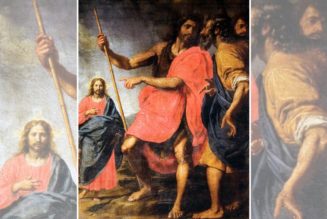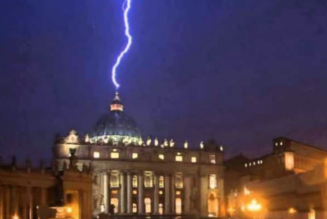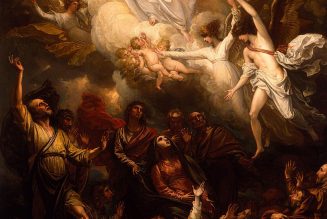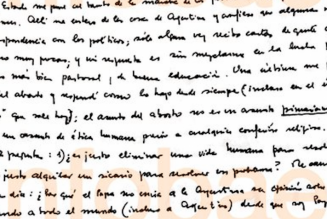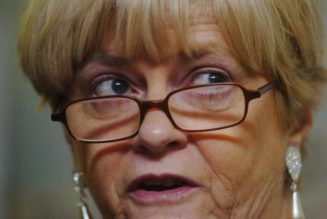Soon after ascending to the Chair of St. Peter in 2005, Pope Benedict XVI was driven across town in order to take possession of the Basilica of St. John Lateran, the mother of all churches. Indeed, the very first Christian basilica built in Rome and the oldest of all the churches in Christendom, it is the place where, until 1870, all previous popes have been enthroned. And there he delivered a powerful and prophetic address on the limits of the Office he now occupied.
It was a salutary reminder both for himself and for the Church he had been elected to lead, not a few of whose members appear lately to have lost their minds. Benedict’s point was a very simple one, one which can be put in the following way: Not everything is permitted. There are a number of hard and fast truths to which even popes must submit. “The one who sits on the Chair of St. Peter,” he reminded everyone, “must remember the Lord’s words to Simon Peter at the Last Supper:
‘You in turn must strengthen your brothers’ (Luke 22:32). The one who holds the office of the Petrine ministry must be aware that he is a frail and weak human being—just as his own powers are frail and weak—and is constantly in need of purification and conversion.
The whole point of being pope, in other words, is not to bear witness to oneself, or to others whom one might wish to flatter or cajole, but to Jesus Christ, who remains the centerpiece of everything the pope says or does. Popes are charged, by no less an authority than God Himself, to speak the Word, orienting everything to the One who remains the perpetual font of our and the world’s being. Christ, therefore, must increase while everyone else, including especially his representatives on planet earth, must decrease.
Whatever power Christ conferred upon Peter, and all his successors down through the centuries, is not about this or that pope’s own private preferences, but rather the clear and public defense of a common faith, one which none of us could have invented and all of us are obliged to uphold. It is certainly not anything we, along with great big popes, are at liberty to change.
Having the power to teach or to govern or to sanctify, therefore, is a charism that only Christ can confer, and one whose exercise, particularly in the papal office, requires at every turn, “a commitment to the service of obedience to the faith.
The Pope is not an absolute monarch whose thoughts and desires are law. On the contrary: the Pope’s ministry is a guarantee of obedience to Christ and to his Word. He must not proclaim his own ideas, but rather constantly bind himself and the Church to obedience to God’s Word, in the face of every attempt to adapt it or water it down, and every form of opportunism.
So many temptations, as it were, are served up by the spirit of a fallen age, and their very insidiousness will need especially to be resisted by Christ’s Vicar. The example of his saintly immediate predecessor came instantly to mind. Here was someone, said Benedict, who, “in the face of erroneous interpretations of freedom,” nevertheless stood tall in the saddle, insisting without the slightest equivocation upon “the inviolability of the human being and of human life from the moment of conception until natural death. The freedom to kill,” about which John Paul II simply would not compromise, “is not true freedom, but a tyranny that reduces the human being to slavery.”
And so he would not bend, giving the world an example of holy intransigence in the face of the world’s rejection of the sacredness of life and of the origin of life, including the truth about the complementarity of the sexes. The whole moral architecture of the universe may not be cast aside, God having inscribed it in the order of nature, which His grace aims to perfect.
Why else would the Book of Genesis begin with man and woman, insisting thereby upon a binary human family? Even popes are expected to recognize and uphold this because, as Benedict reminded his audience: “The Pope knows that in his important decisions, he is bound to the great community of faith of all times, to the binding interpretations that have developed throughout the Church’s pilgrimage.
Thus, his power is not being above, but at the service of, the Word of God. It is incumbent upon him to ensure that this Word continues to be present in its greatness and to resound in its purity, so that it is not torn to pieces by continuous changes in usage.
Among those changes in usage, surely the most egregious example these days would be the ever-growing acceptance of what used to be called sodomy. Yet here we see an acceleration of change made possible not only by engines fueled by the agents of the sexual revolution but, more and more, by churchmen themselves, whose perhaps well-intentioned gestures of tenderness and compassion evince a sentimentality wholly at odds with the teaching of the Church they represent.
They need to cut it out or get out. In short, they need to heed the words of Benedict, which resonate with a conviction that leaves no one, not the pope, nor his bishops and priests, nor the least member of the laity, free to change the content of the Faith or the moral demands it asks of all of us. God’s Word is everlasting and its strictures apply with a specificity that can be, as in the case of the sexual order, both wonderfully and, yes, even quite scandalously particular.
Maybe someone should send His Holiness a handwritten note reminding him of some of the requirements of the job he’s got?
[Photo Credit: Shutterstock]
Join Our Telegram Group : Salvation & Prosperity





